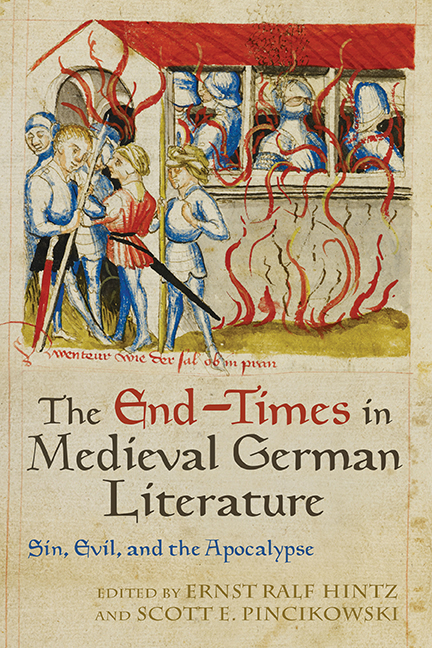Book contents
- Frontmatter
- Dedication
- Contents
- Acknowledgments
- Introduction
- 1 Thiu wirsa giburd: Cain’s Legacy, Original Sin, and the End of the World in the Old Saxon Genesis
- 2 The Heliand Revisited: Spiritual Transgendering and the Defiance of Evil
- 3 The Beginning of the End: Binary Dynamics and Initiative in Hartmann von Aue’s Gregorius
- 4 Poetic Reflections in Medieval German Literature on Tragic Conflicts, Massive Death, and Armageddon
- 5 Beyond Good and Evil: Apocalyptic Vision without Judgment in the Nibelungenlied. An Essay
- 6 End-Times in the Hall: The Modern Reception of the Apocalyptic Ending of the Nibelungenlied
- 7 Past Present, Future Present? Visualizing Arthurian Romance and the Beholder’s Share in a World That Refuses to End
- 8 Ich diene und wirbe / biz ich gar verdirbe: Lovesickness, Apocalypse, and the End-Times in Mauritius von Craûn and Das Nibelungenlied
- 9 The Slippery Concept of Evil in Hartmann von Aue’s Erec and Iwein
- 10 Wigamur’s Lessons on the Complexity of Evil
- 11 The Miracles of the Antichrist
- 12 Monsters and Monstrosities in the Pamphlet Wars of the Reformation
- Notes on the Contributors
- Index
3 - The Beginning of the End: Binary Dynamics and Initiative in Hartmann von Aue’s Gregorius
Published online by Cambridge University Press: 21 March 2020
- Frontmatter
- Dedication
- Contents
- Acknowledgments
- Introduction
- 1 Thiu wirsa giburd: Cain’s Legacy, Original Sin, and the End of the World in the Old Saxon Genesis
- 2 The Heliand Revisited: Spiritual Transgendering and the Defiance of Evil
- 3 The Beginning of the End: Binary Dynamics and Initiative in Hartmann von Aue’s Gregorius
- 4 Poetic Reflections in Medieval German Literature on Tragic Conflicts, Massive Death, and Armageddon
- 5 Beyond Good and Evil: Apocalyptic Vision without Judgment in the Nibelungenlied. An Essay
- 6 End-Times in the Hall: The Modern Reception of the Apocalyptic Ending of the Nibelungenlied
- 7 Past Present, Future Present? Visualizing Arthurian Romance and the Beholder’s Share in a World That Refuses to End
- 8 Ich diene und wirbe / biz ich gar verdirbe: Lovesickness, Apocalypse, and the End-Times in Mauritius von Craûn and Das Nibelungenlied
- 9 The Slippery Concept of Evil in Hartmann von Aue’s Erec and Iwein
- 10 Wigamur’s Lessons on the Complexity of Evil
- 11 The Miracles of the Antichrist
- 12 Monsters and Monstrosities in the Pamphlet Wars of the Reformation
- Notes on the Contributors
- Index
Summary
HARTMANN VON AUE'S Gregorius—the “strange tale” of a nobleman born of an incestuous relationship between brother and sister, who later unknowingly marries his mother, thus repeating and aggravating the sin of incest, and after a self-imposed penance of miraculous difficulty and duration is summoned from the wilderness of his penance to be pope in Rome—seems to have as happy an ending as a story of compounded incest could have. Believing that they will never see one another again after parting upon discovery of their incestuous relationship as husband and wife, son and mother are joyfully rejoined in the end. He, having in the meantime obtained the role of supreme spiritual father, is now positioned to forgive them their sins. Son (now also as spiritual father) and mother live their remaining lives together in what seems a spiritualized and thus redeemed version of their former sinful togetherness, before being received into the eternal bliss of the heavenly afterlife. Interpretations of this tale have tended to focus on the eschatological questions with which the present volume is occupied, particularly the status of the individual (i.e., individual agency, decisions, thoughts, plans, actions, etc.) between the influential effects of the wiles of the devil and God's power to forgive sin, no matter how heinous or great. Recurring admonitions of different kinds from the storyteller Hartmann have doubtless encouraged the view of Gregorius as in some way or another a cautionary tale. With a view to the potential ultimate result (or end) following from any presumed transgressive action (understood as beginning)—for example, eventual damnation and hellfire following from the deadly sin of zwîvel (desperation)—whatever it may be that the tale is cautioning its audiences against (assuming something other than desperation alone) could be regarded as the beginning of the end.
This essay explores a different approach to Hartmann's Gregorius that understands beginning and end as interrelated by what I call binary dynamics. My approach involves viewing characters and courses of events in terms of two distinctive evaluative orientations that I term courtly-chivalric and religious-dualistic.
- Type
- Chapter
- Information
- The End-Times in Medieval German LiteratureSin, Evil, and the Apocalypse, pp. 50 - 71Publisher: Boydell & BrewerPrint publication year: 2019



